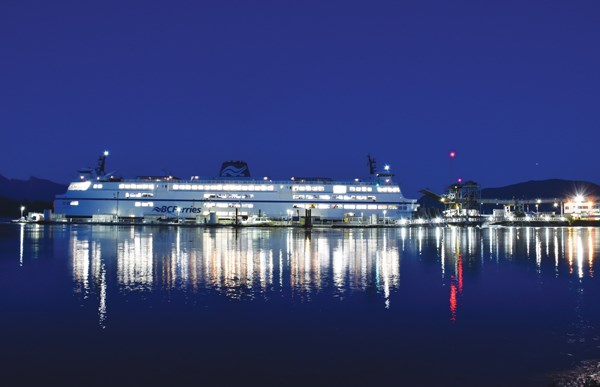Despite additional sailings and assurances from BC Ferries that they have the capacity to meet summer travel demands, overloads are still commonplace on the Langdale-Horseshoe Bay run – and Sunshine Coast residents are becoming increasingly vocal in expressing their frustrations.
One of the biggest targets for complaints recently has been how BC Ferries is handling the province’s ministerial order directing it to give residents priority, along with shipments of essential goods and essential workers travelling to and from their jobs.
“That seems to be a very hot topic within the communities,” Southern Sunshine Coast Ferry Advisory Committee (FAC) chair Diana Mumford said at the July 16 meeting of the Sunshine Coast Regional District’s transportation advisory committee.
“People seem to feel that if they are a resident, and they say that they are a resident, then they go to the front of the line. The challenge is they're not asking for ID. So everybody is saying they are residents and those lineups are just as long as ever.”
Mumford said it doesn’t seem to be resolving the issue and it’s put BC Ferries staff in the position of trying to deal with “very irate people.”
Some of those irate people have taken to social media to try to organize a protest outside a July 27 Sechelt Chamber of Commerce meeting where BC Ferries CEO Mark Collins will be speaking via video link.
And there’s now an online petition calling for “proper ferry service” for the Sunshine Coast.
“With no legitimate programs in place to give residents actual priority loading this leaves commuters, people travelling for appointments in the city and other essential travelling stuck behind hundreds of other people who claim to be residents because they know they’ll have a better chance of catching the next boat,” the petition preamble reads.
Collins addressed resident priority loading in an update this week aimed specifically at Sunshine Coast residents.
Collins said it’s been a challenge to balance the ministerial order on resident priority with the need for coastal communities to start opening up to tourism to restart their economies.
“It has become a serious issue on [Route 3] and other routes,” Collins said.
“Resident priority loading means we make all reasonable efforts to get a resident on the sailing. However, it doesn’t mean we bump reservations or essential goods or workers from the ship for a resident.”
Collins said BC Ferries is going to continue using the honour system, even though they are finding “some travellers may not be telling the truth about their status.”
“We believe checking everyone’s ID would create greater pressure on the check-in process and uncontrollable waits outside the terminal during busy periods,” Collins said. “BC Ferries is not an enforcement agency so we ask for your honesty and your patience with our employees.”
Mumford told the transportation committee that BC Ferries deserves credit for “trying as hard as they can to service their customers with what they have,” adding: “They have heard what we’ve said from the Coast, and we have seen some fairly quick action.”
SCRD chair Lori Pratt said the recent announcement of federal money for B.C. through the safe restart agreement with the provinces makes this “an opportune time to put any pressure on if we can” to get federal and provincial support for BC Ferries.
Premier John Horgan did not answer a question at his July 16 media availability about whether any of the $2.2 billion from the agreement will be used for BC Ferries, although he did say some will be used to cover the losses suffered by BC Transit and Translink because of the drop in fare-paying customers.



